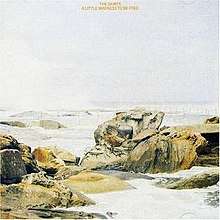A Little Madness to Be Free
| A Little Madness to Be Free | ||||
|---|---|---|---|---|
 | ||||
| Studio album by The Saints | ||||
| Released | July 1984 | |||
| Recorded | A Studio Sydney, Australia. Additional recording at Richmond Recorders Melbourne, Australia. Mixed at Alberts Studio Sydney, Australia | |||
| Genre | Alternative rock, post-punk | |||
| Label |
Lost (France) RCA (Australian 1984) Mushroom Records (Australian 1989 Reissue) | |||
| Producer | Lurax Debris (Chris Bailey) | |||
| The Saints chronology | ||||
| ||||
| Professional ratings | |
|---|---|
| Review scores | |
| Source | Rating |
| Allmusic | |
A Little Madness to Be Free was the sixth album to be released by Australian band The Saints. This time around, frontman Chris Bailey persuaded original members, Kim Bradshaw (bass) and Ivor Hay (drums), to rejoin the band. On the album tour, the bass player was ex-The Birthday Party man Tracy Pew.
Track listing
All tracks composed by Chris Bailey
The Australian version
- "Ghost Ships" – 3:41
- "Some One to Tell Me" – 2:48
- "Down the Drain" – 2:28
- "It's Only Time" – 3:26
- "Imagination" – 3:00
- "Wrapped Up and Blue" – 3:35
- "Walk Away" – 3:00
- "Photograph" – 3:56
- "The Hour" – 5:43
- "Angel" – 3:34
The 'New Rose' version
The French 'New Rose' release included an extra track "Heavy Metal" and an alternate track listing omitting "Wrapped Up and Blue".
- "Down the Drain"
- "Walk Away"
- "Photograph"
- "The Hour"
- "Angels"
- "Imagination"
- "Only Time"
- "Someone to Tell Me"
- "Heavy Metal"
- "Ghost Ships"
Personnel
- Performers - Chris Bailey, Alex Hamilton, Chris Burnham, Emile Kiss, Fiona Morphett, Iain Shedden, Ivor Hay, Janine Hall, Michael Charles, Pearl Bayly, Richard Daniell, Sally Schinckel-Brown
- Engineers – Tony Cohen and David Hemmings
- Executive producers - Neville Bicci Henderson and Paul Comrie-Thompson
- Photography - Bob King
Trivia
The title of the album is a reference to the quote "A person needs a little madness, or else they never dare cut the rope and be free," by Kazantzakis.
This article is issued from
Wikipedia.
The text is licensed under Creative Commons - Attribution - Sharealike.
Additional terms may apply for the media files.